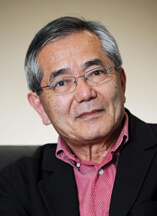Purdue professor and Nobel laureate elected to National Academy of Sciences
April 30, 2014
 |
|
Ei-ichi Negishi |
WEST LAFAYETTE, Ind. - Purdue University Nobel laureate Ei-ichi Negishi has been elected into the National Academy of Sciences, one of the highest honors given to a scientist or engineer in the United States.
Negishi, the Herbert C. Brown Distinguished Professor and Teijin Limited Director of the Negishi-Brown Institute, was elected to the academy as a foreign associate in recognition of his distinguished and continuing achievements in original research. He will be inducted into the academy at its next annual meeting.
"Dr. Negishi has earned the highest honors bestowed upon a scientist, but election to membership in the National Academy of Sciences is a particularly distinguished recognition to add to his list of accolades," said Purdue President Mitch Daniels. "The honors bestowed upon him also reflect positively on the Department of Chemistry, the College of Science and the university, and we share in this proud moment. His work has improved many areas of our lives, from pharmaceutical manufacturing to electronics. And even after such inspiring achievements, he continues his work and strives to solve scientific challenges to better our world."
Negishi, a citizen of Japan, won the 2010 Nobel Prize in chemistry for his palladium-catalyzed cross coupling technique to link carbon atoms and synthesize molecules. In addition to its use in the development of the painkiller naproxen and the cancer treatment taxol, it is estimated that "Negishi coupling" is used in more than one-quarter of all chemical reactions in the pharmaceutical industry. The technique also has been used in fluorescent marking essential for DNA sequencing and in the creation of materials for thin LED displays.
Negishi is among 84 new members and 21 foreign associates elected to the academy this year. Through this honor he once again follows in the footsteps of the late Herbert C. Brown, Negishi's mentor and Purdue's first Nobel Prize winner, who was elected to the academy in 1957.
Negishi joins four Purdue colleagues as current members of the academy. Those previously elected are Joseph S. Francisco, the William E. Moore Distinguished Professor of Earth and Atmospheric Sciences and Chemistry; H. Jay Melosh, distinguished professor of earth, atmospheric and planetary sciences and physics; Michael Rossmann, the Hanley Distinguished Professor of Biological Sciences; and Jian-Kang Zhu, distinguished professor of plant biology.
Negishi currently serves as the inaugural director of Purdue's Negishi-Brown Institute, which supports basic research in catalytic organometallic chemistry through graduate and postdoctoral fellowships, regular workshops and symposia, and relationships with industrial partners.
Negishi grew up in Japan and received a bachelor's degree in organic chemistry from the University of Tokyo in 1958. He moved to the United States in 1960 to attend graduate school at the University of Pennsylvania as a Fulbright-Smith-Mundt scholar, earning a doctorate in organic chemistry in 1963. Negishi came to Purdue in 1966 as a postdoctoral researcher under Brown, who won the Nobel Prize in 1979. Negishi went to Syracuse University in 1972, where he was an assistant professor and then an associate professor before returning to Purdue in 1979.
He was appointed the H.C. Brown Distinguished Professor of Chemistry in 1999 and has won various awards, including a Guggenheim Fellowship, the A.R. Day Award, a 1996 Chemical Society of Japan Award, the 1998 American Chemical Society Organometallic Chemistry Award, a 1998 Humboldt Senior Researcher Award and the 2010 American Chemical Society Award for Creative Work in Synthetic Organic Chemistry. He also was given the 2010 Order of Culture, Japan's highest distinction, and named as a Person of Cultural Merit. Negishi has authored more than 400 publications including two books, one of which is the Handbook of Organopalladium Chemistry for Organic Synthesis. Collectively, these publications have been cited more than 20,000 times.
The National Academy of Sciences is a private, nonprofit society of distinguished scholars engaged in scientific and engineering research, dedicated to furthering science and technology and their use for the general welfare. Established by an Act of Congress, signed by President Abraham Lincoln in 1863, the academy is charged with providing independent, objective advice to the nation on matters related to science and technology.
Among the academy's renowned members are Albert Einstein, Robert Oppenheimer, Thomas Edison, Orville Wright and Alexander Graham Bell. Nearly 200 living academy members have won Nobel Prizes.
There are currently 2,214 active members and 444 foreign associates. Foreign associates are nonvoting members of the academy, with citizenship outside the United States. For more information and the full list of newly elected members, visit http://www.nationalacademies.org.
Writer: Elizabeth K. Gardner, 765-494-2081, ekgardner@purdue.edu
Source: Mitch Daniels, president@purdue.edu
Related news releases:
Purdue's Nobel laureate to lead new research institute
Purdue professor wins Nobel Prize in chemistry
Related video:

